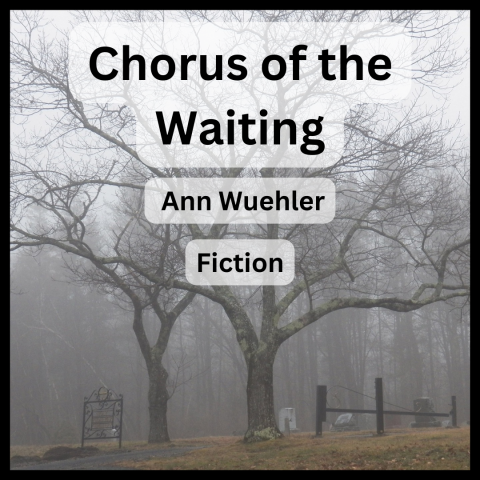Chorus of the Waiting

Image created onCanva
They gather near about the same day every year. Near Christmas Eve. The remains of that old church near Evans Hill graveyard, way back in the woods where no one buries their beloveds anymore. I been the caretaker round about here for some twenty-three years.
Only job a Stanley can get in these parts. My father ran the local bank, you see. I’m one of those Stanleys. Richard Stanley had no thought for his own when he ran into the night and disappeared. For his two sons or his three daughters or our mother who had never lifted a hand to wash a dish or cook a stew.
But that’s not what you want to hear. You asked about the gatherings. If that is real or not. Or just some Evansby tall tale to give folks a tingle and a thrill when sleepy over too much beef, on Christmas Day and ready for such tellings of magic, miracles, and happy endings.
This is not such a tale. Not yet. Maybe never. I shall long perhaps be in a cheap coffin when most get their waited-for desires.
I live here in this old shack. I redid the roof myself after the big branch hit my roof. I can just see the remains of Grace United, the burned timbers rotting to this very hour, the pews overturned, the hymnals grown to the size of shrubs by weather and mold.
A single stained glass window remains yet, cracked and warped, but it has yet to crumble as the others did. I think it’s a depiction of the loaves and fishes story. But it could be anything.
The church had fallen into disuse before it burned down, truth be told. The congregation built a new one over by Silky Pond. Yes, it’s a drab place full of dour, sour old biddies but what church is not? I cannot understand myself why churches sour folks so. It should be a place of joy and hope, but any church I dared attend seemed full of bitter air and weeping babies.
That was near a hundred years ago, of course, that fire that took the church. Evansby has not grown or prospered. A forgotten spot far off the main roads full of farmers, teachers, and crackpots. Just like any other tiny town in any other forgotten corner of the world.
It’s rather comforting. Knowing nothing here really changes and those who insist on being in charge refuse to let changes within a hundred miles of this not so idyllic place. I think that’s why they find the old Grace United remnants. I think it’s why they sit in the old pews, sing the old songs in their whispers.
Ghosts, of course. Or maybe something else entirely. Souls. Naked souls without the covering of a body. I don’t know what they are exactly. I just call them ghosts.
I’ve seen them, yes.
As night falls on or about Christmas Eve, they trudge past this old shack. Their heads are always down, their eyes leaking tears or so full of sorrow it causes my nose to bleed if they glance my way.
I try not to be near the window there. I cannot bear to meet their pale eyes. They don’t hate. They grieve. They grieve so hard it hurts my head and my nose drips blood for a bit. I’d rather they hate me watching them than silently ask me to know a bit of their pain. They wear no clothes. I can see their bodies striped with scars.
They carry their dead mice, offerings offered is all I can figure from that. Some float by, just the upper half visible, as if they have melted like a candle or fat in a pan. As if they are fading and will fade to nothing over the years.
Grace United’s remaining floor is a litter of mice bones.
Once, one drifted to this window, a half of a ghost, and she peered in at me. No more than a child, with a child’s round unformed face and hair that had been sawed off with a dull knife perhaps. She rubbed at that butchered hair as if it yet itched or hurt her. Her pale eyes met mine, once, before she turned back to follow the others toward the church.
And I wondered what a child had done to earn this punishment or whatever it is. These cannot be the folks of heaven or some joyful Elysium. And I wonder if they escaped or if something let them loose to plead their cases before whatever judges would hear such cries. If their captors had more mercy than the gods who condemned them. I wonder that a lot.
Yes, I followed them one year. I was younger, full of rancid notions of revenge and clearing my stained name in Evansby annals. I had lost everything in a gamble in real estate. Pride and reckless impatience to be someone other than Richard Stanley’s second eldest son, Ben Stanley, cost me much.
I begged for this terrible job of watching over a graveyard no one visits anymore and accepted the pittance the town paid, to live in this shack and try to salvage something to go elsewhere, begin again.
But.
I followed after the last of them, near the midnight hour. A cold clear night, the snow sparkling, with the morning promising another storm. Owls called, I remember that. I saw several stray dogs. But it was the ghosts I followed, not the starving mutts tossed out by uncaring sorts when they outgrew their puppyness to become awkward munchers of the family shoes.
The ghosts moved into the remains of the church, seated themselves, even righting the pews. They let their dead mice offerings fall as they might. As if placing those tiny corpses would be too noticeable or too much in some way. I watched the ghosts right the pews, drop their mice, their faces far away, wishing they did not have to do this humiliating ritual at all.
Sometimes they looked toward me standing far back but their concerns were not due to being observed or gossiped about by some disgraced man in a raggedy patched coat. I did not know then, as I know now, that not everyone can see them. Some defect in me, perhaps, allows me to view these ghosts.
Their concerns were conducting this service, playing their parts of supplicants and beggars of favors, and waiting for an answer, any answer, to their spoken and silent prayers.
There were perhaps a hundred or more there. That first time I followed them. The second and other times, it differed. Sometimes ten or fewer.
Sometimes so many crowded that burned down church they had to stand instead of sit and their voices filled the sky above with such anguish I had to return to my shack, blood dripping from my nose, the taste of pennies far back in my throat.
As if they had peeled layers of my heart and shredded my brain with their whispered singing to a god that perhaps did not even hear them anymore.
Yes, I spoke to one of them. Once.
She was the very last one, not ten years ago. It seemed that year that only eight or so wandered past, most only half there. She crept to my window, peeked in and I asked her business. “What do you want?” I asked her. “Why do you come here to this place?” Something foolish and arrogant and too loud.
My little stove glowed red, the night so fiercely cold, I remember that as well. A night that would freeze those who had to sleep out in it for whatever reason. One of the coldest nights ever recorded here in Evansby. I wore my old ragged coat, I had my scarf about my throat, I shivered anyway as that cold found every crack and crevice it could, to try and kill me if it could.
It was that kind of merciless cold.
Maybe tonight, she said as clear as anything, her eyes pale with no pupils at all. Her wisps of hair floated about her head, she was not much more than a girl, really. Maybe tonight God will relent.
Which god? my lips asked. “Any of them,” she answered, before nodding at me as polite as pie, before drifting off toward the church and the services that would begin at some unknown signal.
I put on my coat; I followed after her. She sat near the back, her head down, her lips moving.
A glimmer about her face, a mouse sitting on her shoulder, alert and white-breasted, ink drop eyes watching me before turning them on the girl, whose head lifted even as she turned to sparkling dust, even as the others there turned in slow envy and slower hope that they would disappear in the very air, that a mouse would leap from their shoulder to scuttle about on the floor.
She remained the only one this happened to. The others looked to the altar, their voices blending like a poison in my ears. I have yet to hear a song soaked with the blood of hope and the corrosion of rust on metal as that one was. That last plea before the hangman snaps your neck, yet you dangle there still trying to breathe.
I had to flee, the living mouse darting through the crowd of the dead. Maybe the dead mice were guides. I do not know. The ghosts will not or cannot tell me.
The last time I dared watch this Christmas Eve begging for relief from whatever tormented them so, a man walked to the altar they had propped up on broken timbers. I knew him. I knew him, for he wore my face. His white eyes marked me.
Whatever he had meant to speak or direct the others to do, he seemed to forget for a moment. And I saw such rage and agony swirl across that scarred, marked face of his. As if a bear had clawed him repeatedly.
Richard Stanley had never been handsome but his face had held charm and light, enough to fool others into trusting him with everything they had in the world. Even as I stared at my own father among this host of souls, he grew fainter and fainter until nothing of him remained. No sparkling dust, no reborn mouse, just a fading away.
The others sighed and stirred, rustled, their heads hanging before they began to turn toward me, to watch me with a steady awful pity. I watched as one by one, they turned their heads, put their backs to me, their faces lowering.
A soft singing began from a man seated on the very front pew and the rest took it up. A song I did not know but a song about snow and cold and waiting for light. A song about the ending of a night that could never end.
A song about remembering love when love had no meaning at all anymore. I stumbled away, fell several times, nearly broke my arm on an old gravestone, returned to my shack here not sure at all if I was yet sane.
I have not returned since then to see if my father has returned to beg with the rest for whatever peace they might be afforded yet. I have not returned to see if any of them become that sparkling dust and drift in the currents of the air toward whatever soft, sweet place they seek.
And he is the only one of the ghosts I ever saw display rage.
That is all I know. I hardly get any visitors anymore. But I was never a friendly chap. If you tell this to anyone, be kind. That’s all I ask. Be a little kind when you describe me or the ghosts. They are not used to kindness, I think.
No. No, I will never drift with those who come to this church. I’d rather remain in whatever pit of night I fall into after my death. I’d rather not hope at all for light and warmth and sweet voices calling me to rest. It would be unbearable. I have never feared the night. I will not fear it after death, either.
Perhaps all I can wish, in that regard, is forgetting I ever wanted or hungered or waited for love. Or that I grew too warped to leave this shack, too afraid to seek places that did not know the shameful history of my kith and kin.
I hope whatever gods preside over all this business of death grant me forgetfulness. And that I am allowed to fade to nothing at all. I hope that is my fate for being a failure and coward nearly all my life.
So be kind when you tell this tale, if you tell it at all. That’s all an old man can ask of such a visitor as you. So full of hope yet and trusting that life will not be wasted or squandered. Good luck and Merry Christmas.
Looking for more fiction? The many contributors and staff at MockingOwl Roost have plenty to offer.

Ann Wuehler
Ann Wuehler has written five novels-- Aftermath: Boise, Idaho, Remarkable Women of Brokenheart Lane, House on Clark Boulevard, Oregon Gothic and the Adventures of Grumpy Odin and Sexy Jesus. Her Roxie and Ericka is included in Well, This is Tense, from Bag of Bones Press. Sefi and Des is in Brigid Gate’s Musings of the Muses. Her short story, Jimmy’s Jar Collection, appeared in the Ghastling’s 13.
Find more on Ann’s website.





7 Comments
[…] Chorus of the Waiting […]
[…] Chorus of the Waiting […]
[…] Chorus of the Waiting […]
[…] Chorus of the Waiting – Short Story […]
[…] Chorus of the Waiting – Haunting Christmas Eve Fiction […]
[…] Chorus of the Waiting […]
[…] Chorus of the Waiting – Speculative Fiction […]